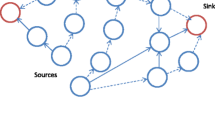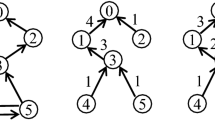Abstract
A fundamental problem in wireless sensor networks is to maximize network lifetime under given energy constraints. In this paper, we study the network lifetime problem by considering not only maximizing the time until the first node fails, but also maximizing the lifetimes for all the nodes in the network, which we define as the Lexicographic Max-Min (LMM) node lifetime problem. The main contributions of this paper are two-fold. First, we develop a polynomial-time algorithm to derive the LMM-optimal node lifetime vector, which effectively circumvents the computational complexity problem associated with an existing state-of-the-art approach, which is exponential. The main ideas in our approach include: (1) a link-based problem formulation, which significantly reduces the problem size in comparison with a flow-based formulation, and (2) an intelligent exploitation of parametric analysis technique, which in most cases determines the minimum set of nodes that use up their energy at each stage using very simple computations. Second, we present a simple (also polynomial-time) algorithm to calculate the flow routing schedule such that the LMM-optimal node lifetime vector can be achieved. Our results in this paper advance the state-of-the-art algorithmic design for network-wide node lifetime problem and facilitate future studies of the network lifetime problem in energy-constrained wireless sensor networks.
Similar content being viewed by others
References
I.F. Akyildiz, W. Su, Y. Sankarasubramaniam and E. Cayirci, Wireless sensor networks: A survey, Computer Networks (Elsevier) 38 (2002) 393–422.
M.S. Bazaraa, J.J. Jarvis and H.D. Sherali, Linear Programming and Network Flows, 2nd edition (John Wiley & Sons, 1990).
D. Bertsekas and R. Gallager, Data Networks (Prentice Hall, 1992).
M. Bhardwaj, T. Garnett and A.P. Chandrakasan, Upper bounds on the lifetime of sensor networks, in: Proceedings of the IEEE International Conference on Communications, (ICC'01), Helsinki, Finland, June (2001) pp. 785–790.
M. Bhardwaj and A.P. Chandrakasan, Bounding the lifetime of sensor networks via optimal role assignments, in: Proceedings of IEEE INFOCOM, New York, NY June (2002) pp. 1587–1596.
D. Blough and S. Paolo, Investigating upper bounds on network lifetime extension for cell-based energy conservation techniques in stationary ad hoc networks, in: Proceedings of the 8th ACM International Conference on Mobile Computing and Networking (MOBICOM'02), Atlanta, GA, September (2002) pp. 183–192.
T.X. Brown, H.N. Gabow and Q. Zhang, Maximum flow-life curve for a wireless ad hoc network, in: Proceedings of the 2nd ACM Symposium on Mobile Ah Hoc Networking and Computing (MOBIHOC'01), Long Beach, CA, Oct. (2001) pp. 128–136.
J.-H. Chang and L. Tassiulas, Routing for maximum system lifetime in wireless ad-hoc networks, in: Proceedings of the 37th Annual Allerton Conference on Communications, Control, and Computing, Monticello, IL, (Sept 1999) pp. 22–31.
J.-H. Chang and L. Tassiulas, Energy conserving routing in wireless ad-hoc networks, in: Proceedings of IEEE INFOCOM, Tel Aviv, Israel, (March, 2000) pp. 22–31.
J.-H. Chang and L. Tassiulas, Fast approximate algorithms for maximum lifetime routing in wireless ad-hoc networks, in: Proceedings of the IFIP-TC6 Networking, LNCS, Springer-Verlag, May (2000) pp. 702–713.
J. Chou, D. Petrovis and K. Ramchandran, A distributed and adaptive signal processing approach to reducing energy consumption in sensor networks, in: Proceedings of IEEE INFOCOM, San Francisco, CA, March (2003) pp. 1054–1062.
S. Doshi, S. Bhandare and T.X. Brown, An on-demand minimum energy routing protocol for a wireless ad hoc network, ACM Mobile Computing and Communications Review 6(3) (2002) pp. 50–66.
J. Gomez, A.T. Campbell, M. Naghshineh and C. Bisdikian, Conserving transmission power in wireless ad hoc networks, in: Proceedings of the 9th IEEE International Conference on Network Protocols, (ICNP'01), Riverside, CA, November (2001) pp. 24–34.
W. Heinzelman, Application-specific Protocol Architectures for Wireless Networks, Ph.D. thesis, Massachusetts Institute of Technology, (June 2000).
Y.T. Hou, H. Tzeng and S.S. Panwar, A generalized max-min rate allocation policy and its distributed implementation using the ABR flow control mechanism, in: Proceedings of IEEE INFOCOM, San Francisco, CA, March (1998) pp. 1366–1375.
K. Kalpakis, K. Dasgupta and P. Namjoshi, Maximum lifetime data gathering and aggregation in wireless sensor networks, in: Proceedings of the 1st IEEE International Conference on Networking (ICN'02), Atlanta, GA, August (2002) pp. 685–696.
Q. Li, J. Aslam and D. Rus, Online power-aware routing in wireless Ad-hoc networks, in: Proceedings of the 7th ACM International Conference on Mobile Computing and Networking (MOBICOM'01), Rome, Italy (July 2001) pp. 97–107.
A. Michail and A. Ephremides, Energy efficient routing for connection-oriented traffic in ad-hoc wireless networks, in: Proceedings of the 11th IEEE International Symposium on Personal, Indoor and Mobile Radio Communications (PIMRC'00), London, UK, (September 2000) pp. 762–766.
A. Misra and S. Banerjee, MRPC: Maximizing network lifetime for reliable routing in wireless environments, in: Proceddings of the IEEE Wireless Communications and Networking Conference (WCNC'02) (March 2002) pp. 800–806.
S.S. Pradhan, J. Kusuma and K. Ramchandran, Distributed compression in a dense sensor network, IEEE Signal Processing Magazine 19(2) (2002) 51–60.
M.B. Pursley, H.B. Russell and J.S. Wysocarski, Energy-efficient routing in frequency-hop radio networks with partial-band interference, in: Proceedings of the IEEE Wireless Communications and Networking Conference (WCNC'00), Chicago IL (September 2000) pp. 79–83.
R. Ramanathan and R. Rosales-Hain, Topology control of multihop wireless networks using transmit power adjustment, in: Proceedings of IEEE INFOCOM, Tel Aviv, Israel (March 2000) pp. 404–413.
K. Ramchandran, Distributed sensor networks: opportunities and challenges in signal processing and communications, presentation at NSF Workshop on Distributed Communications and Signal Processing for Sensor Networks, December 2002, Evanstaon, IL. Available at http://www.ece.northwestern.edu/pappas/nsf_workshop/presentations/ramchandran_workshop_DDSP.ppt.
T.S. Rappaport, Wireless Communications: Principles and Practice (Prentice Hall, New Jersey, 1996).
V. Rodoplu and T.H. Meng, Minimum energy mobile wireless networks, IEEE Journal on Selected Areas in Communications 17(8) (1999) pp. 1333–1344.
S. Singh, M. Woo and C.S. Raghavendra, Power-aware routing in mobile ad hoc networks, in: Proceedings of the 4th ACM International Conference on Mobile Computing and Networking (MOBICOM'98), Dallas, TX, (October 1998) pp. 181–190.
I. Stojmenovic and X. Lin, Power-aware localized routing in wireless networks, IEEE Transactions on Parallel and Distributed Systems 12(11) (2001) pp. 1122–1133.
R. Wattenhofer, L. Li, P. Bahl and Y.-M. Wang, Distributed topology control for power efficient operation in multihop wireless ad hoc networks, in: Proceedings of IEEE INFOCOM, Anchorage, AK, (April 2001) pp. 1388–1397.
G. Zussman and A. Segall, Energy efficient routing in ad hoc disaster recovery networks, in: Proceedings of IEEE INFOCOM, San Francisco, CA March (2003) pp. 682–691.
Author information
Authors and Affiliations
Corresponding author
Additional information
Y. Thomas Hou obtained his B.E. degree from the City College of New York in 1991, the M.S. degree from Columbia University in 1993, and the Ph.D. degree from Polytechnic University, Brooklyn, New York, in 1998, all in Electrical Engineering. From 1997 to 2002, Dr. Hou was a research scientist and project leader at Fujitsu Laboratories of America, IP Networking Research Department, Sunnyvale, California(Silicon Valley). Since Fall 2002, he has been an Assistant Professor at Virginia Tech, the Bradley Department of Electrical and Computer Engineering, Blacksburg, Virginia. Dr. Hou's research interests are in the algorithmic design and optimization for network systems. His current research focuses on wireless sensor networks and multimedia over wireless ad hoc networks. In recent years, he has worked on scalable architectures, protocols, and implementations for differentiated services Internet; service overlay networking; multimedia streaming over the Internet; and network bandwidth allocation policies and distributed flow control algorithms. He has published extensively in the above areas and is a co-recipient of the 2002 IEEE International Conference on Network Protocols (ICNP) Best Paper Award and the 2001 IEEE Transactions on Circuits and Systems for Video Technology (CSVT) Best Paper Award. He is a member of ACM and a senior member of IEEE.
Yi Shi received his B.S. degree from University of Science and Technology of China, Hefei, China, in 1998, a M.S. degree from Institute of Software, Chinese Academy of Science, Beijing, China, in 2001, and a second M.S. degree from Virginia Tech, Blacksburg, VA, in 2003, all in computer science. He is currently working toward his Ph.D. degree in electrical and computer engineering at Virginia Tech. While in undergraduate, he was a recipient of Meritorious Award in International Mathematical Contest in Modeling and 1997 and 1998, respectively. Yi's current research focuses on algorithms and optimization for wireless sensor networks and wireless ad hoc networks. His work has appeared in highly selective international conferences (e.g., ACM MobiCom and MobiHoc).
Hanif D. Sherali is the W. Thomas Rice Endowed Chaired Professor of Engineering in the Industrial and Systems Engineering Department at Virginia Polytechnic Institute and State University. His area of research interest is in discrete and continuous optimization, with applications to location, transportation, and engineering design problems. He has published about 200 papers in Operations Research journals, has co-authored four books in this area, and serves on the editorial board of eight journals. He is a member of the National Academy of Engineering.
Rights and permissions
About this article
Cite this article
Hou, Y.T., Shi, Y. & Sherali, H.D. On Node Lifetime Problem for Energy-Constrained Wireless Sensor Networks. Mobile Netw Appl 10, 865–878 (2005). https://doi.org/10.1007/s11036-005-4444-6
Published:
Issue Date:
DOI: https://doi.org/10.1007/s11036-005-4444-6




